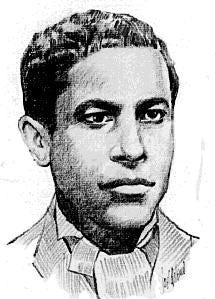Issue #465 Today In Black History, Friday, January 19, 2024
Today’s Black History WOW!
Jan Ernst Matzeliger was born on September 15, 1852, in Paramaribo, Dutch Guiana (now Suriname). Matzeliger became one of the most influential figures in the history of industrial engineering.
At the age of 10, he started working as an apprentice in his father's machine shop, where he honed his skills in mechanics and design. Recognizing his potential, his employer decided to sponsor his further education in the field of engineering.
In 1877, Matzeliger moved to the United States, hoping to find better opportunities for his innovative ideas.
After settling in the United States, Matzeliger worked for several years to learn English. As a dark-skinned man, his professional options were limited, and he struggled to make a living in Philadelphia. In 1877, Matzeliger moved to Lynn, Massachusetts, to seek work in the town's rapidly growing shoe industry. He found a position as an apprentice in a shoe factory. Matzeliger learned the cordwaining trade, which involved crafting shoes almost entirely by hand.
Cordwainers made molds of customers' feet, called "lasts," with wood or stone. The shoes were then sized and shaped according to the molds. The process of shaping and attaching the body of the shoe to its sole was done entirely by hand with "hand lasters,” with each shoe requiring around 50 manual steps to complete. Matzeliger recognized the need for a more efficient method, and he dedicated himself to finding a solution.
Finally, in 1883, Matzeliger patented the lasting machine and received patent number 274,207 for his machine. This revolutionary invention automated the previously time-consuming process of attaching the upper part of the shoe to the sole, dramatically increasing production rates. The lasting machine could produce up to 700 pairs of shoes in a single day, ten times the amount of hand lasting. This innovation not only reduced the cost of shoe production but also paved the way for the mass production of affordable footwear.
Because of the color of his skin, he was not mentioned in the history books until recently. Contemporaries referred to him as the "Dutch nigger" and his machine as the "niggerhead laster," a term used in the apparel industry at the time for a certain type of fabric.
In 1889, the Consolidated Lasting Machine Company was formed to manufacture the devices, with Matzelinger receiving a large amount of stock in the organization. After Matzeliger's death, the United Shoe Machinery Company acquired his patent.
Matzeliger sacrificed his health by working exhausting hours on his invention and not eating over long periods. He caught a cold which quickly developed into tuberculosis, and he died in 1899 in Lynn, Massachusetts just before his 37th birthday.
A 29-cent US postal stamp was issued on September 15, 1991, in honor of Matzeliger and is a part of the Black Heritage Stamp Series.
Today’s Black History
- In 1848, Black inventor Lewis Temple invented the “Temple Toggle,” which revolutionized the whaling industry by attaching a hook to a harpoon that held whales securely.
- In 1861, Georgia seceded from the Union.
- In 1871, the 1st Negro Lodge of the U.S. Masons was approved in New Jersey.
- In 1969, UCLA renamed its social science buildings in honor of alumnus Black diplomat Ralph Bunche who received the 1950 Nobel Peace Prize for his late 1940s mediation in a Middle East peace treaty.
- In 1977, Clifford Alexander, Jr. was named as the first Black Secretary of the U.S. Army.
- The “Comments” feature has been disabled. Instead, let’s discuss these facts in our community on Substack Notes. You can also read other Substack publications without subscribing to them when you join Notes.
This post is free to read/listen to for two days. To have 365 24/7 access to all our posts and podcast episodes and financially support “We Are Speaking” for no more than $5 per month, please subscribe at the paid level.
Are you an independent author or creative professional looking for a place where you can tackle those branding and marketing challenges and learn with me through valuable books and online courses? The Global Creative Community Branding and Marketing Academy (GCC BMA) is for you!








